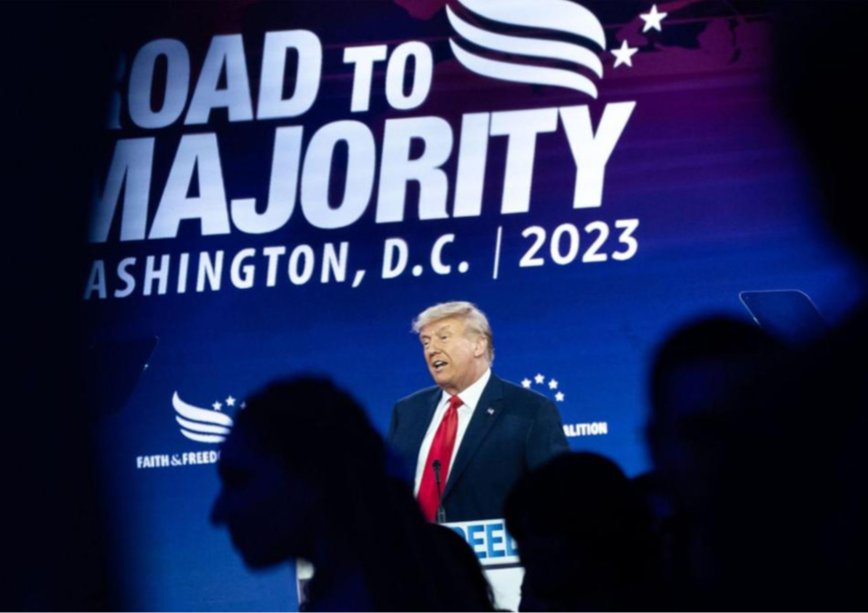-
CENTRES
Progammes & Centres
Location
Trump vs Biden is a rematch most Americans don’t want, but it is what they will likely get.

Not very long ago, the Republican presidential race in the US looked packed with four frontrunner candidates: Donald Trump, Nikki Haley, Ron DeSantis and Vivek Ramaswamy. In the last few weeks, the US presidential race has gradually entered a more decisive phase.
Although neither the Democratic nor the Republican camp has finalised their presidential candidate, the Iowa Caucus, the New Hampshire Republican primary, and the most recently-held Nevada Caucus may have imparted some perspicuity. Trump is leading as the Republican presidential candidate on the back of his victory in all the three.
Trump’s win over Haley in New Hampshire is widely seen as the end of the road for the latter, quite in line with the political trend associated with New Hampshire. In 1968, a poor show in the New Hampshire primary forced president Lyndon Johnson to quit his presidential campaign.
Trump’s win over Haley in New Hampshire is widely seen as the end of the road for the latter, quite in line with the political trend associated with New Hampshire.
Since 2001, the New Hampshire Republican primary has correctly predicted the Republican candidacy for the president every year. The South Carolina primary on February 24 will be critical for Haley, that being her native state where she has served as Governor from 2011 to 2017.
In the Democratic camp, Pre sident Joe Biden may be facing little resistance from his Democratic peers but a latest 345-page special counsel report from the Department of Justice has not only raised questions about Biden’s ‘poor memory’ but his handling of classified documents. Robert F Kennedy Jr and Cornel West running as Independents and Jill Stein from the Green Party have not yet been able to make any mark.
A Biden-Trump rematch seems the most likely outcome of the primaries and caucuses which are lined up running up to the national elections in November this year.
Trump needs 1,215 delegates to secure his nomination from the Republican Party and he looks on his path to secure it without much difficulty, leading with 62 delegates. Not for the first time, the Republican party has rallied behind Trump who now commands support of his loyal voters as well as Republicans in the Congress. Perhaps, his legal hurdles might be the only impediment preventing his nomination or his victory.
However, polls have indicated that Trump’s support has soared despite his numerous indictments. In fact, there is growing pressure on Haley to drop out of the presidential race before the primary in her home state of South Carolina on February 24.
Not for the first time, the Republican party has rallied behind Trump who now commands support of his loyal voters as well as Republicans in the Congress.
The New Hampshire voting pattern, however, revealed that a section of independent voters, college-educated voters, and Republicans who see the January 6 Capitol riots as an act of insurrection by Trump and believe he should be legally answerable for the same. This faction voted for Haley. It remains to be seen whether this chunk of voters will shift their votes or skip voting altogether should Trump secure his nomination.
The Republicans are confident that a majority of the voters from their party will vote for Trump.
Among Trump’s advantages is the fact that he is a known entity for American voters and they know what to expect should he come to the helm.
A major swing in Trump’s support has come from rural America, where his candidacy is being seen as a factor for against immigration, making them turn their backs on the Democrats. Although this trend may be a nationwide phenomenon, perhaps the shift in Iowa is the most stark—it turned from a swing state to a Republican stronghold.
Meanwhile, President Biden has laid out his reason to run against Trump entirely on the latter being his opponent by saying, ‘we cannot let him win.’ In a recent speech, he underscored that democracy is a ‘central cause’ of his presidency. While his democracy vs autocracy trope remains a primary pivot of his campaign and distinction from Trump, that the latter presents an existential threat to US democracy in his second term may not have resonated with the voters in the same way that the Democratic party wanted it to.
A major swing in Trump’s support has come from rural America, where his candidacy is being seen as a factor for against immigration, making them turn their backs on the Democrats.
Biden’s political campaign may not have gathered the momentum and uproar that it should have and appears blunted by various factors. These range from his age, casting doubts over his ability to act as President for the next term to a seemingly failed immigration strategy. As much as 6.3 million incidents of migrant encounters have been reported since Biden took office in January 2021. In both Iowa and New Hampshire, voters have rated immigration at par with economy in its importance as an election issue. Trump has left no stone unturned in ensuring that he paints Biden as a president who is responsible for an unprecedented flow of migrants to the US. In his campaign, Trump has taken his 2016 narrative centred on building a wall on the US-Mexico border to another level by saying that immigrants are ‘poisoning the blood of our country’.
Trump vs Biden is a rematch that most Americans do not want, but they have little choice. In one of the recent polls, Biden is trailing Trump by 6 percentage points in a 34-40 tally. Political pundits have pointed out that Biden’s campaign should look beyond Trump. Biden’s latest plan is to launch an offensive campaign by attacking Trump and his central campaign themes such as abortion rights, attack on personal freedom and rely on social media, influencers and celebrities, including Taylor Swift, to turn the polls in his favour.
A politically ascendant Trump has engendered a range of concerns and feelings both domestically as well as externally. Globally, a Trump presidency would significantly change the course of US foreign policy from the trajectory it has followed under the Biden administration. Of particular interest would be how a Trump presidency deals with the ongoing wars in Europe and the Middle East, a consolidating China-Russia-Iran-North Korea axis and the resultant fractured world order. If his campaign speeches and past presidency are anything to go by, Trump would curb US aid to Ukraine, weaken the trans-Atlantic alliance and enfeeble its global alliance network, all in the name of ‘Make America Great Again’. And predictably, the unpredictability associated with his last term will return to haunt an already battered global geopolitical landscape.
This commentary originally appeared in Financial Express.
The views expressed above belong to the author(s). ORF research and analyses now available on Telegram! Click here to access our curated content — blogs, longforms and interviews.

Professor Harsh V. Pant is Vice President – Studies and Foreign Policy at Observer Research Foundation, New Delhi. He is a Professor of International Relations ...
Read More +
Vivek Mishra is Deputy Director – Strategic Studies Programme at the Observer Research Foundation. His work focuses on US foreign policy, domestic politics in the US, ...
Read More +